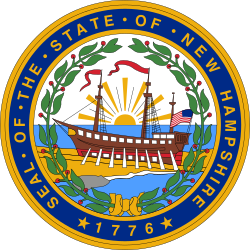| |||||||||||||||||
| |||||||||||||||||
 County results Williams: 50–60% 70–80% Berry: 50–60% | |||||||||||||||||
| |||||||||||||||||
| Elections in New Hampshire |
|---|
 |
The 1848 New Hampshire gubernatorial election was held on March 8, 1848, in order to elect the governor of New Hampshire. Incumbent Democratic governor Jared W. Williams won re-election against Whig nominee and former member of the New Hampshire Senate Nathaniel S. Berry. [1]

